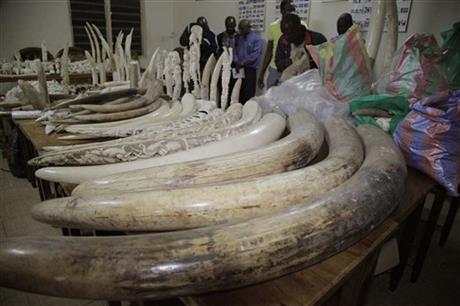 By ERICK KAGLAN
By ERICK KAGLAN
In this photo taken Tuesday, Aug. 6, 2013, ivory carvings and elephant tusks seized from the shop of alleged ivory trafficker Emile N’Bouke are displayed at the offices of Togo’s agency charged with combatting the trafficking of drugs and other illicit substances in Lome, Togo. Activists say the high profile trafficker’s work has fueled the slaughter of more than 10,000 elephants dating back to the 1970s. Togo’s environment minister Dede Ekoue said Wednesday that N’Bouke was found to be in possession of 700 kilograms of ivory at the time of his arrest Tuesday afternoon at his shop in Lome.(AP Photo/Erick Kaglan)
LOME, Togo (AP) — A high-profile ivory trafficker whose work activists say has fueled the slaughter of more than 10,000 elephants dating back to the 1970s has been arrested in Togo, the country’s environment minister said Wednesday.
The trafficker, Emile N’Bouke, was found to be in possession of 700 kilograms (1,500 pounds) of ivory at the time of his arrest Tuesday afternoon at his shop in Lome, the capital, Dede Ekoue said.
It was the first arrest of its kind in the small West African nation, which has emerged in recent years as a main transit point for ivory bound for Asia and other markets, said Ofir Drori, founder of the Last Great Ape Organization that began investigating N’Bouke late last year.
N’Bouke, 58, was known locally as “The Boss” because of his seniority in the country’s ivory trade, which was banned globally in 1989.
Speaking to journalists after his arrest, he said he had been trading ivory since 1983 and had managed to obtain and renew a “special permit” despite the ban.
But Ekoue, the environment minister, said this was untrue, and vowed that Togo would crack down on the ivory trade more aggressively from now on.
“This activity can no longer prosper because the Togolese government is committed to discouraging further action from criminals who use our territory as a platform,” she said.
Togo is home to West Africa’s only natural deep water port, and Drori said the high volume of shipping makes it easier to transport illicit goods such as ivory.
Last month, more than two tons of ivory hidden in a cargo container at the port was seized in Hong Kong. Last December, some 24 tons of ivory sent from Togo was seized in Malaysia.
Drori said the undercover investigation revealed that N’Bouke had been operating since 1976.
He said that like many large-scale traffickers, N’Bouke was not just a buyer, but was also involved in the financing of poaching activities targeting elephants throughout Central Africa.
N’Bouke’s activities likely led to the killing of “dozens of thousands” of elephants, he said.
Drori said he suspects N’Bouke had clients in the United States, something he plans to investigate now that N’Bouke is behind bars.
Under the current law, N’Bouke faces a maximum of one year in prison for his involvement in the ivory trade, Drori said. But he added that he would push authorities to prosecute N’Bouke for other crimes such as money laundering that could lead to a longer sentence.
___
Associated Press writer Robbie Corey-Boulet contributed to this report from Dakar, Senegal.



